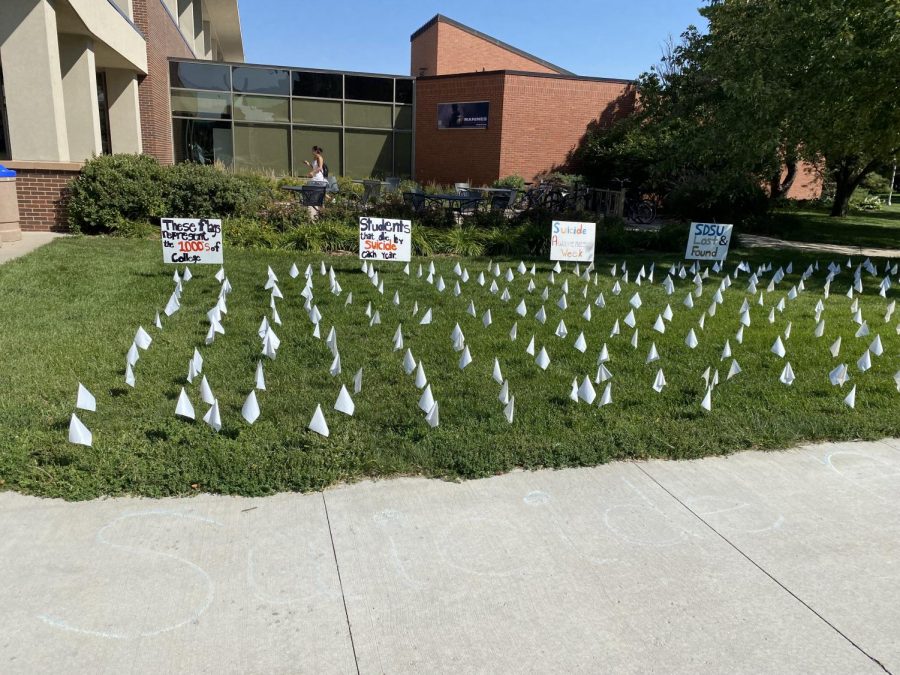SDSU looks to improve students’ mental health
Counseling, mental health days and crisis line among improved resources for students
September 28, 2021
Mental health concerns caused by the COVID-19 pandemic have spurred SDSU officials to come up with new ways to help students stay healthy.
University officials have seen an uptick in the use of mental health resources since the pandemic began in spring 2020.
For example, one counselor from the Student Health Clinic and Counseling Services went from an average of 19 sessions per day in 2020 to 23 sessions per day the next year, according to Greg Wasberg, a counselor at the Wellness Center.
Counselors also are dealing with more “intense” counseling sessions, according to Carrie Jorgensen, a counselor at the Wellness Center and the head of Lost and Found, an organization that helps people struggling with thoughts of suicide.
“Intense sessions involve issues such as suicide and severe anxiety,” Jorgensen said.
To deal with the added mental health strains the pandemic has caused, the university has created new programs. A peer-to-peer mentoring program and a new crisis line to the University Police Department are two examples. Some professors are helping by easing up on attendance policies, and the Students’ Association is advocating for a reduction in wait times for counseling visits.
Peer-to-peer mentoring is a new resource that South Dakota State and Lost and Found are administering. Peer-to-peer mentoring is a way first and second-year college students can better learn how to deal with campus life with the help of an upperclassman.
This could involve talking about their major or going to events with them, Jorgensen said. This will be the resource’s first full year on campus, and the list to be a part of the peer-to-peer program is growing.
Mentors do not have to be upperclassmen to help with first and second-year students, Jorgensen said.
“Before, we could only do a one-on-one session, and then outreach to the students about their problems after a while,” Jorgensen said. “Now, the Wellness Center has special counseling groups that tackle all sorts of problems from anxiety, grief, trauma, drugs and alcohol, etc.”
The UPD crisis line is new this year, but what makes it special is the on-call counselor who is on 24/7.
“The 24/7 line is always available,” Doug Wermedal, vice president of Student Affairs, said. “Just call the UPD line whenever you’re not mentally well and ask for an on-call counselor. The transfer will take seconds, and a counselor will be ready to help with whatever needs you have.”
Another change geared to help students’ mental health is happening in classrooms. Some professors are helping students with free time away from class. Jacob Wallace, director of the Wind Symphony, has a new policy in his syllabus: two mental health days a semester where students don’t need an excuse to miss class.
“As a teacher, it’s ideal to maximize the potential of learning for students, but the process is a self-directed process from the students, and if they’re not in a state where their mental wellness allows them to be able to be optimized for learning, then we can’t succeed,” Wallace said. “I can’t be successful no matter how great of a teacher I am that day.”
The Students’ Association is also concerned with mental health on campus. SA President Andrew Rasmussen is always looking to improve the situation, and his goal is to reduce wait times for counseling appointments.
Wait times are the times in-between sessions for counseling visits. Sometimes it takes almost two weeks to get a student back with a counselor. The worst wait times were about four weeks, and that was during fall 2020, Rasmussen said.
“One thing we are committed to is making sure that if a student is ready to ask for help, that the help is going to be there in a timely manner,” Rasmussen said. “So, we don’t want to see those long wait times.”
Events to look forward to this year that will be directed at mental health are a suicide prevention speaker and a “Zumbathon” about mental health awareness and suicide.
The Zumbathon is a Zumba day that students are encouraged to attend, and it deals with mental health while participating in Zumba activities. This includes how to recognize certain mental health problems, how to deal with those problems and how to help others.
“I think there is a lot of tension and polarization in the climate of almost any topic you can talk about,” Wallace said. “Until we can get to a point where we aren’t so polarized, you may see improvements in mental health and wellness, but until that day we have to promote positive mental health here on campus.”



















